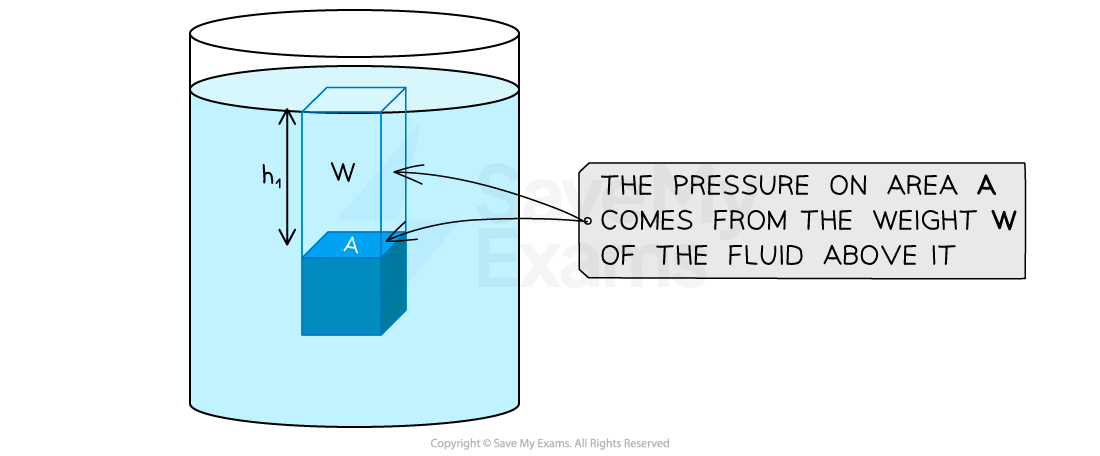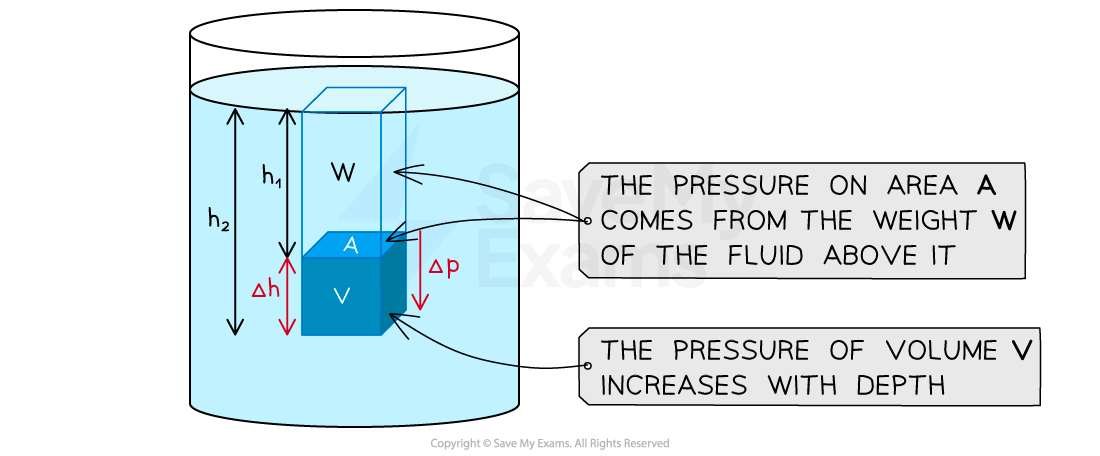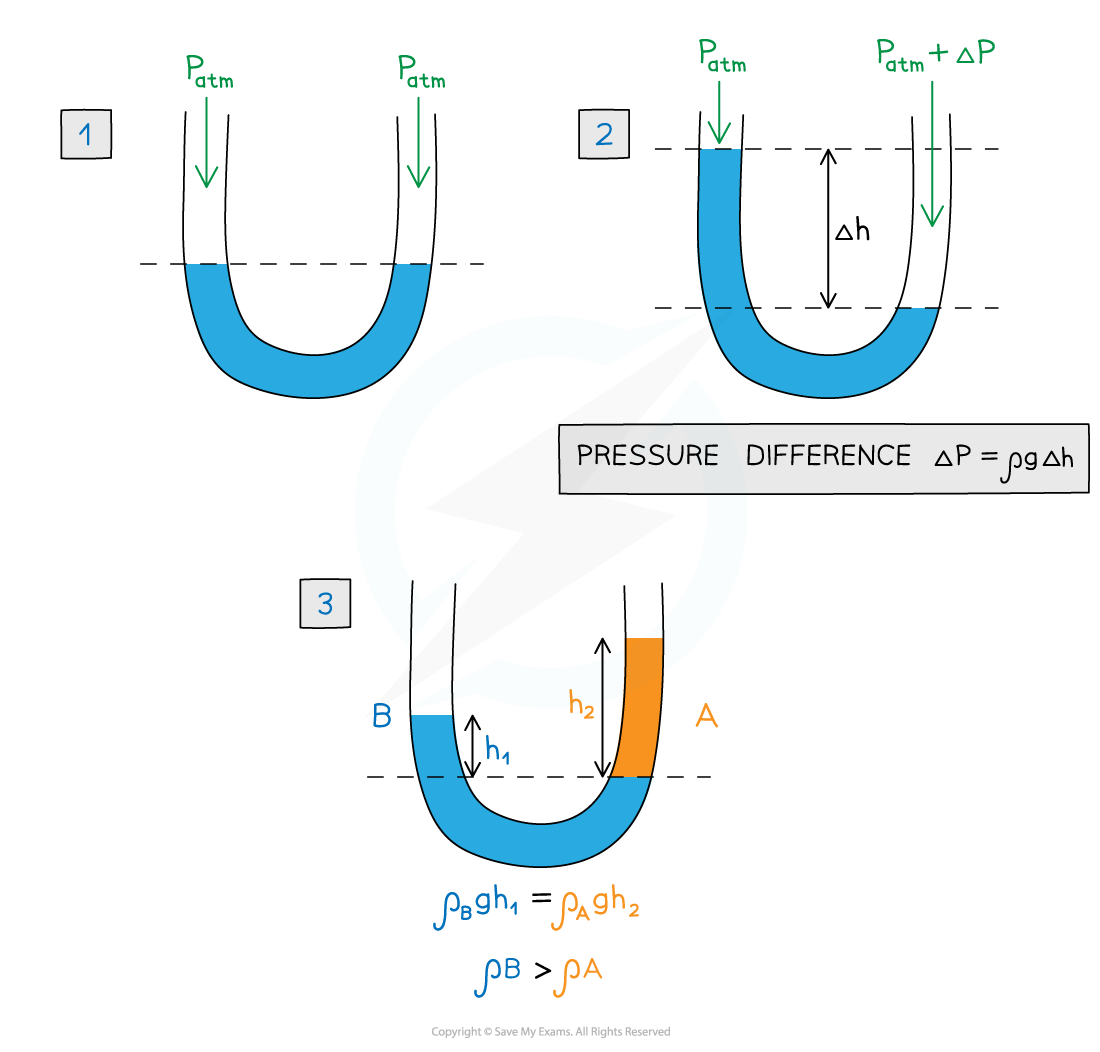Derivation of ∆p = ρg∆h (Cambridge (CIE) AS Physics): Revision Note
Exam code: 9702
Derivation of ∆p = ρg∆h
Hydrostatic pressure is the pressure at any given point within a fluid, that is exerted by the weight of the fluid above that point
If the fluid is at rest, then all the points within the fluid are in equilibrium
Therefore, the pressure acts in all directions at each point
Pressure on a point in a fluid

The hydrostatic pressure on area A is due to the weight, W, of the volume of fluid above it
The weight, W, of the fluid above area A is given by:
Using the density equation, mass can be given as:
Substituting this expression for mass into the weight equation gives:
Therefore, the pressure exerted on area A can be given as:
Within the volume of the cube V, there is a change in pressure between the top and bottom surfaces
Change in pressure through a volume of fluid

The pressure at the bottom of the cube with volume V is greater than the area A at the top of the cube, because there is an increasing amount of fluid above, which increases the force of weight W acting upon it
The change in pressure can be found by considering the change in height of the volume of fluid above the lower surface
This gives the equation for hydrostatic pressure:
Where:
Δp = change in pressure in pascals (Pa)
ρ (Greek letter rho) = density of fluid in kilograms per metre cubed (kg m-3)
Δh = change in height in metres (m)
g = gravitational field strength in newtons per kg (N kg-1)
Using the equation for hydrostatic pressure
When an object is immersed in a liquid, the liquid will exert a pressure which acts in all directions, squeezing the object
The size of this pressure depends upon:
The density, ρ, of the liquid
The depth, h, of the object
The gravitational field strength, g
The total pressure acting on the object considers both the weight of the fluid above the object, and the weight of the air above the object
When asked about the total pressure, the atmospheric pressure must also be included
Total pressure = Hydrostatic pressure + Atmospheric pressure
Atmospheric pressure (also known as barometric pressure) is 101 325 Pa
U-tube manometer
A manometer is an instrument to measure pressure and density of two liquids
A U-tube manometer

A U-tube manometer shows changes in pressure as the liquid moves in the tube
In Figure 1: The level of liquid is equal because the atmospheric pressure (Patm) is the same
In Figure 2: If the pressure on one side rises, the liquid will be forced down making the liquid in the other limb rise. The difference between the two levels gives the pressure difference between the two ends of the tube
In Figure 3: The U-tube now has two different liquids. The density of the blue one is greater than that of the orange one. The pressure at each point is due to the atmospheric pressure plus the weight of the liquid above it
Worked Example
Atmospheric pressure at sea level has a value of 100 kPa. The density of sea water is 1020 kg m-3.
At what depth in the sea would the total pressure be 250 kPa?
A. 20 m
B. 9.5 m
C. 18 m
D. 15 m
Answer:
Step 1: List the known quantities and convert to SI units:
Atmospheric pressure = 100 × 103 Pa
Total pressure = 250 × 103 Pa
Density of sea water, ρ = 1020 kg m-3
Gravitational field strength, g = 9.81 N kg-1
Step 2: Recall the equation for total pressure
total pressure = hydrostatic pressure + atmospheric pressure
Step 3: Substitute in the hydrostatic pressure equation
total pressure = + atmospheric pressure
Step 4: Rearrange for change in height
Step 5: Substitute in the known values to calculate
Examiner Tips and Tricks
The values for pressure given in exam questions can vary widely and depend on metric prefixes such as kPa or MPa.
It is always safest to convert all the pressure values to SI units (Pa) before you begin the calculation, to minimise the chance of making a mistake.

Unlock more, it's free!
Did this page help you?